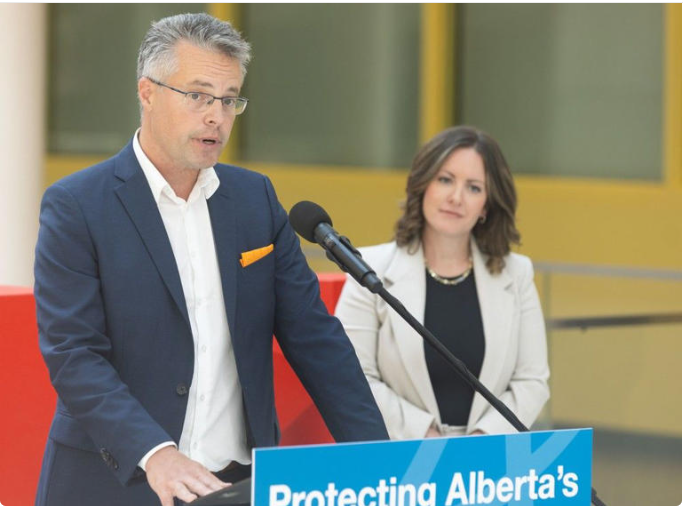Story by Steven Wilhelm
Emissions Reduction Alberta CEO Justin Riemer speaks alongside Rebecca Schulz, Minister of Environment and Protected Areas at a June press conference. On Wednesday Alberta's plan to invest up to $49 million from the industry-funded Technology Innovation and Emissions Reduction program was announced.
The province is injecting up to $49 million into an industry-funded program aimed at protecting the environment while creating hundreds of jobs.
Environment and Protected Areas Minister Rebecca Schulz unveiled Alberta’s invest in the Technology Innovation and Emissions Reduction program on Wednesday.
The funding will support 18 new projects, create almost 1,600 jobs and add $233 million to Alberta’s economy by 2027, according to the province.
“Alberta has the resources, the expertise and the entrepreneurs needed to create some of the most advanced materials in the world. This $49-million investment is incredibly important to accomplishing that,” Justin Riemer, CEO of Emissions Reduction Alberta, said at a news conference.
T he 18 projects , which are scattered across Alberta, aim to reduce annual emissions by more than 155,000 tons, or a cumulative 3.4 million tons by 2030, according to Riemer.
He noted that each project is unique, but there is a common theme.
“Each support(s) the extraction, the production, the manufacturing and the circular life cycle of new and existing material products for Alberta,” said Riemer.
“This funding supports technologies that make better use of our resources while cutting costs. It’s a win for both the economy and the environment,” he said.
Calgary-based Nova Chemicals was among the recipients, receiving $5 million to advance its $25-million plant. When complete, the facility will divert more than 36,000 tons of single-use plastics annually from landfills and incineration.
“We’ve been focused on creating value through Alberta’s natural resources and driving innovations (to) reshape how plastics are designed, made and incorporated into different structures,” said Rocky Vermani, Nova Chemicals’ senior vice-president of innovation, sustainability and strategy.
“Nova is well-positioned to lead the transition to a circular economy,” said Vermani.
A circular economy refers to a system in which materials never become waste, and nature is “regenerated.”
“Nova is just one great example of the many incredible companies that put Alberta on the map as a global leader in manufacturing,” said Schulz.
Other companies receiving funding include those in waste management, carbon utilization, critical minerals, energy storage, geothermal, oilsands and more.
Alberta’s first recycling system for agricultural plastics, and a facility that turns wood waste from construction, demolition and renovation into valuable building materials are also among those included, according to the province.
Pro-Pipe Service and Sales Ltd. received $1 million through the program, aimed at developing and producing drill pipe technology to minimize heat loss while surviving challenging pressures and temperatures associated with ultra-deep geothermal drilling.
“We’re advancing this Alberta-built insulated drill pipe to unlock geothermal zones above 300 C, zones that offer 10 times more energy per well than conventional systems,” said Dan Porodo, president of Pro-Pipe.
The technology will reduce the cost of geothermal development and make it possible to deliver carbon-neutral power to remote communities, said Porodo.
“It’s a launch pad for clean energy, jobs, emissions reduction and Alberta’s next energy industry,” he said.
swilhelm@postmedia.com

